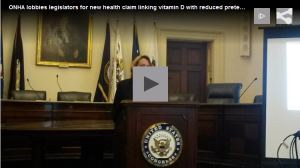New JAMA Pediatrics meta-analysis supports vitamin D role in improving infant growth

These results were drawn by collecting and synthesizing the existing body of research on vitamin D and infant health published up to October 2017.
The researchers, affiliated with the University of Montreal and McGill University, screened 728 potential relevant studies and narrowed it down to 24 randomized controlled trials with 5,405 participants combined on vitamin D and infant health.
They added that existing evidence suggests no harmful side effects of mothers supplementing with vitamin D, as the benefits come “without an increased risk of fetal or neonatal mortality or congenital abnormality.”
Their report was published on Monday in the journal JAMA Pediatrics.
Prompting their meta-analysis was the “high prevalence of low vitamin D level status during pregnancy and the public health importance of clarifying the role of vitamin D during pregnancy in offspring health,” they wrote.
O&N CEO: Results are ‘positive’ for group’s FDA petition to add vitamin D health claim
The Canadian meta-analysis was one of two studies published this week in JAMA Pediatrics that link vitamin D supplementation to infant and maternal health. The other was a clinical trial conducted by University of Helsinki researchers, which found that 400 IUs of vitamin D3 daily was enough to make sure children under two years had sufficient vitamin D.
Results from the Canadian meta-analysis was described as ‘positive’ by Karen Howard, CEO and Executive Director of the Organic & Natural Health Association (O&N), who commented on the study independently.
The association she helms filed a citizen’s petition to the FDA in March, asking the agency to approve a health claim connecting vitamin D supplementation with a reduction in premature birth risk.
“We continue to promote research that demonstrates the effectiveness of vitamin D, and other nutrients where deficiency jeopardizes health status, and appreciate well documented results on how specific nutrient levels impact health and disease,” she told us.
The FDA has until July 13 to make a decision on how it wants to proceed with O&N’s petition to add preterm health claims for vitamin D supplementation.
“We remain highly confident we can effectively address any questions FDA might have, and will work with them during the deliberation process.”
Conflicting results?
The Canadian meta-analysis stands in contrast with another meta-analysis, published in The BMJ in November 2017, in which researchers concluded that the “the evidence to date seems insufficient to guide clinical or policy recommendations” on vitamin D intake for pregnant women.
Video
The Organic and Natural Health Association recently visited Capitol Hill to ask Congress for help reducing the more than 1,000 preterm births that occur daily in North America by supporting its FDA petition for a health claim declaring the link between higher vitamin D blood levels and a decreased risk of preterm birth. (Originally published April 16, 2018)
Researchers from the University of Toronto, who conducted the BMJ meta-analysis, argued that most trials on prenatal vitamin D published by September 2017 “were small and of low quality” – many of which were the same studies used to meta-analyze the newer Canadian meta-analysis published this week in JAMA Pediatrics.
“It is no surprise that the public is left shaking its head in confusion on the power of nutrients,” Howard said of these conflicting results.
“What O&N is asking for is open discourse and consideration of the fact that nutrient research can’t be solely dose driven like pharmaceutical RCTs,” she added.
“Yes, RCTs play an essential role, however, health impact is directly related to the levels of nutrients which can, and do, vary dramatically in individual persons.”
Not just vitamin D
“It is not only vitamin D that finds itself rebutting or applauding the results of RCTs and meta-analyses,” Howard argued.
“Putting aside the merits or limitations of both, our goal is to document the power of nutrients for the benefit of the consumers who ‘believe’ their health is improved by taking vitamin D, omega 3, magnesium, and the list goes on,” she added.
“Enabling them to test their levels, monitor dosage accordingly, and see how their health is impacted, creates a personalized profile.”
According to her, more work on personalized nutrition is already transforming the health care system.
“Now thousands of pregnant women and their doctors are monitoring vitamin D levels, thanks to [organizations like] GrassrootsHealth and the Medical University of South Carolina. Successful pursuit of health claims enables us to educate more people and implement more studies in more healthcare facilities, and change the standard of care,” she said.
Source: JAMA Pediatrics
Published online, doi:10.1001/jamapediatrics.2018.0302
"Association Between Vitamin D Supplementation During Pregnancy and Offspring Growth, Morbidity, and Mortality: A Systematic Review and Meta-analysis"
Authors: Wei Guang Bi, et al.
Source: JAMA Pediatrics
Published online, doi:10.1001/jamapediatrics.2018.0602
"Effect of Higher vs Standard Dosage of Vitamin D3 Supplementation on Bone Strength and Infection in Healthy Infants: A Randomized Clinical Trial”
Authors: Jenni Rosendahl, et al.
Source: The BMJ
Published online, doi: https://doi.org/10.1136/bmj.j5237
"Vitamin D supplementation during pregnancy: state of the evidence from a systematic review of randomised trials"
Authors: D. E. Roth, et al.

















